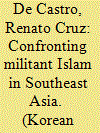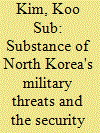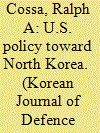|
|
|
Sort Order |
|
|
|
Items / Page
|
|
|
|
|
|
|
| Srl | Item |
| 1 |
ID:
091867


|
|
|
|
|
| Publication |
2009.
|
| Summary/Abstract |
This article is written against the backdrop of widely discussed changes in Japanese foreign security policy in the 2000s-changes often attributed to an intensifying North Korea threat and growing rivalry with China. Employing Walt's notion of "threat" (in effect, offensive power plus aggressive intentions), the thesis of this article is that China and North Korea could be construed as increasingly threatening to Japan. The antithesis is that changes in Japanese foreign security policy have rather taken place within the context of a public discourse that has increasingly framed China and North Korea as "threats." The article demonstrates that, while Chinese military capability has burgeoned in the past decade, North Korea has experienced something like military stagnation. Moreover, although both actors have histories of foreign aggression, their respective official discourses lack aggressive intentions vis-a-vis Japan. The article also demonstrates that while Japanese government sources have kept framing North Korea as a threat or a grave security concern, China has merely been depicted as "in need of further attention." To understand these ambivalent results, the article introduces the synthesizing idea that a North Korean "threat" might serve as a "perfect excuse" for changing Japanese foreign security policy in the face of what could obviously be construed as a more pressing China threat.
|
|
|
|
|
|
|
|
|
|
|
|
|
|
|
|
| 2 |
ID:
091869


|
|
|
|
|
| Publication |
2009.
|
| Summary/Abstract |
This paper focuses on Azerbaijan's outreach toward East Asian countries and its relationship with South Korea. Despite their geographical distance from Azerbaijan, countries in the Far East, especially China, Japan, and South Korea, have demonstrated an interest in engagement and explored potential avenues of cooperation. Azerbaijan established support for its political priorities and for its stance on the Karabakh issue as prerequisites and confidence-building measures for potential investors. East Asian states easily fulfilled these two criteria, due to their geographical and ideological distance from the political dynamics of the Caucasus. South Korea showed a genuine concern for Azerbaijan's national interests and problems and played a key role in its economic development. While South Korea was a latecomer, mutual political trust and fruitful economic relations were quickly established. The Azeri administration has entrusted South Korean public and private investors with many significant current and future projects in the oil- and non-oil-related fields. This paper concludes that these projects are indicators of the central role that South Korea will play in Azerbaijan's future.
|
|
|
|
|
|
|
|
|
|
|
|
|
|
|
|
| 3 |
ID:
091868


|
|
|
|
|
| Publication |
2009.
|
| Summary/Abstract |
This article examines the basis for China's strategic convergence with Russia in the current era, as well as assesses the viability of this convergence in the longer term. It will be argued that the convergence primarily reflects both Chinese and Russian concerns about the lone superpower's preponderance in the international system and its perceived intentions. These concerns relate to the military sphere as well as non-military considerations such as ideological differences. Ultimately, Sino-Russia strategic convergence exists as long as a huge capability gap persists between each partner and the United States. In the short-run at least, China and Russia will continue to balance against the United States.
|
|
|
|
|
|
|
|
|
|
|
|
|
|
|
|
| 4 |
ID:
091870


|
|
|
|
|
| Publication |
2009.
|
| Summary/Abstract |
This article discusses the Bush administration's extension of the War on Terror in Southeast Asia and this operation's main objective-the Abu Sayyaf Group (ASG) in the Philippines. It probes the ASG's history, transnational links, and terrorist operations. Then using content analysis, the article analyzes the terrorist group's primary reading material to determine its ideological affiliation with transnational Islamic militant groups. It then argues that the transnational jihadist ideology is evident in the ASG's primary reading material. The material reflects the ideas of the late Palestinian terrorist Abdullah Azzam, and by implication, those of the late Egyptian poet Sayyid Qutb. In conclusion, the article points out that the influence of jihadist ideology on the ASG is superficial, because of the widely held view that the band is a marginalized group operating at the fringes of the mainstream militant Islamic movement in Southeast Asia.
|
|
|
|
|
|
|
|
|
|
|
|
|
|
|
|
| 5 |
ID:
091866


|
|
|
|
|
| Publication |
2009.
|
| Summary/Abstract |
The Internet poses a "dilemma" to authoritarian countries. While it can bring economic dynamism to a country, it can also cause political destabilization by enabling economic and political information to flow freely beyond governmental control. Internet policies vary from country to country depending upon their own strategies, their level of economic development and international politics. This paper discusses and examines political and economic implications of the Internet in North Korea in relation to theories and notions of the Internet dilemma and control policy in authoritarian regimes. North Korea cannot move drastically from its restrictive and reactive Internet policy to a proactive policy unless there are radical changes of the regime with regard to international relations and economic development. It is expected that North Korea will gradually experiment building and using an intranet internally, and increase the level of Internet opening while arranging technological and institutional measures to mitigate the risks which the Internet may cause. Until recently, the United States and North Korea have had rows over North Korea's nuclear and missile tests, and will continue to do so for some time. These disputes affect North Korea's policy regarding the Internet. However, the political environment surrounding the Korean peninsula is changing very fast. Despite North Korea's rocket launch in April and nuclear test in May 2009, dialogue will begin between North Korea and the United States under the Obama administration. Given the recent changes, it is expected that North Korea will follow Cuba's control policy to minimize the risk of the Internet in the first instance, and then China's open policy to maximize the value of the Internet. When North Korea considers the regime is secured, it will open the Internet with some control measures in place, while free access to the Internet is currently allowed only in special economic zones.
|
|
|
|
|
|
|
|
|
|
|
|
|
|
|
|
| 6 |
ID:
091863


|
|
|
|
|
| Publication |
2009.
|
| Summary/Abstract |
Despite continued strains on its economy, North Korea has yet to relinquish its nuclear weapons program. Coupled with such unwavering determination and tangible actions in the form of nuclear and missile tests, the perception that North Korea is only a threat within the region of the Korean peninsula and its immediate vicinity is antiquated. In fact, given the possibilities of North Korea exporting its missile or nuclear weapons technology to states such as Syria and Iran, ignoring the implications of the security threat posed by Pyongyang as global in scope would be committing a dangerous fallacy. Without exaggerating the threat through ulterior motives far removed from pursuing peace and stability in the region, one needs to set concrete principles on which to base a coherent policy toward North Korea. This would mean correctly identifying the threat from North Korea's arsenals, as well as departing from a highly paternalistic view of the North that only seeks to make Seoul more vulnerable to the security threat. In particular, coordinated bilateral cooperation between the respective administrations of Presidents Lee Myung-bak and Barack Obama may act as an auspicious harbinger to the possible resolution of the North Korean security threat.
|
|
|
|
|
|
|
|
|
|
|
|
|
|
|
|
| 7 |
ID:
091865


|
|
|
|
|
| Publication |
2009.
|
| Summary/Abstract |
President Obama offered to extend a hand to those who were "willing to unclench [their] fist," and promised a clear, consistent, cooperative, and consultative approach to achieve Korean peninsula denuclearization. Unfortunately, Pyongyang chose not to cooperate, deciding instead to challenge the new American leader, in the form of a "satellite launch" that created a crisis where none would have otherwise existed. The reasons why Pyongyang chose to go down this path remain open to wide speculation. But the United States, the Republic of Korea (ROK), and others must now assume that Pyongyang has made the "strategic decision" not to give up its nuclear weapons and must now deal with this reality. What is needed now is a clearly expressed policy of containment aimed at keeping what is in North Korea in North Korea and which keeps out anything else that would help the regime develop its nuclear or missile capabilities. This does not mean that Washington is prepared to recognize North Korea as a nuclear weapons state. The goal still remains the complete, verifiable, irreversible elimination of Pyongyang's nuclear weapons capabilities. The United States does recognize that this will be a multi-stage process and that counter-proliferation is a major step in this process. So is tightening the noose around Pyongyang to increase the political, military, and economic costs associated with going down the nuclear path.
|
|
|
|
|
|
|
|
|
|
|
|
|
|
|
|
| 8 |
ID:
091864


|
|
|
|
|
| Publication |
2009.
|
| Summary/Abstract |
It is often argued that the North Korean regime, if faced with the right combination of pressure and concessions, will surrender its nuclear program. This article is critical of this viewpoint. Pyongyang's decision to go nuclear reflects long-term strategic concerns, and no amount of aid and payments will compensate for the loss of strategic advantages created by the possession of a nuclear capability. At the same time, the outside world does not have sufficiently powerful leverage at its disposal as well. Hence, a prolonged stalemate should be expected.
|
|
|
|
|
|
|
|
|
|
|
|
|
|
|
|
|
|
|
|
|